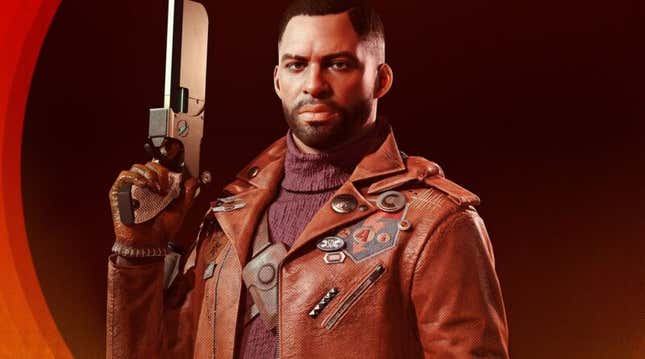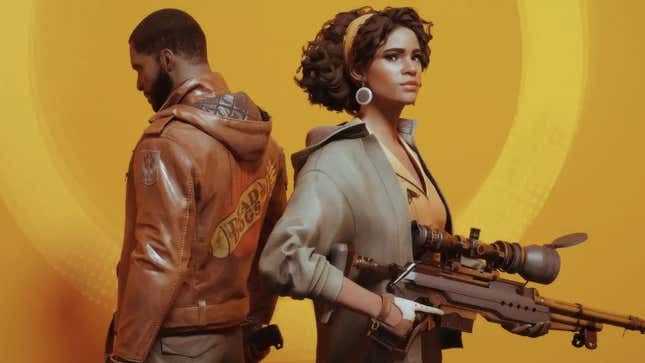
Good Black characters in gaming are rare, and extraordinary Black characters are even more so. Despite the gaming industry continually improving in its portrayal of Black characters, protagonist or otherwise, it still struggles with the concept. I, like most Black gamers who have long had to deal with games that misrepresented our skin, hair, and essence for decades, simply assumed, “We will get there, Lord, when we get there.”
Then I played Deathloop, a current game that understood the assignment and made me say, “Man, to hell with that!” This game reveals that video games can provide us with amazing Black characters immediately, and that the continued failure to do so is simply a choice. Gaming needs more real Black characters, and we need them now. After feeling some type of way, I reached out to Jason Kelley, the voice of Deathloop’s amazing protagonist Colt Vahn, to discuss where so many developers go wrong when creating Black characters, and how, in Deathloop’s leads, Arkane gave us Black characters who feel real.
But before we delve into the nitty-gritty, we need to define what makes a “real” Black character. A lot of “Black” characters in games are Black-passing. Think Barret from Final Fantasy VII or Nessa from Pokémon Sword and Shield. A person that is, maybe, meant to be Black, but in all honesty, is a Spirit Halloween last-minute costume of a Black person.
Many studios create these people, and their characterization is only skin-deep. In the original Final Fantasy VII, Barret is nothing more than the “Black Buck” stereotype, a loud and abrasive, excessively violent, unintelligent brute. In layman’s terms, he’s there to be the angry Black man and little else. In contrast, a real Black character’s depth comes from a combination of their skin color and complexity as an individual. The marriage of melanin, might, malice, mystery, and majesty.
Jason Kelley shared his thoughts on the fundamental failures in how game creators often approach creating Black characters. One major factor being that sometimes Blackness isn’t even part of how those characters are conceived from the beginning. “They write a character in mind, and that character is pretty flavorless. He ain’t got a lot of seasoning,” Kelley said. “And then after they’ve cast their main leads, they go, ‘Oh, well, we should add some diversity. Let’s make this character Black.’ And that’s it. There’s no backstory to who they are. We don’t know how this person showed up in this moment, and these characters come off as very two-dimensional. There’s no flavor to them, and it’s not a negative thing. It’s just because the character’s casting was an afterthought. The richness of our culture isn’t injected into the DNA of the character from the beginning.”
Despite having given us Black avatars here and there for decades, games have only offered a meager handful that even come close to being believable Black people. Don’t believe me? Take a quick trip to Google, and you’ll see the same shortlist of names on every Great Black Characters game list. The Walking Dead’s Lee Everett and Marcus Holloway from Watch Dogs 2 are obvious standouts, along with the occasional Grand Theft Auto all-star. Take away characters that deal with slavery, racism, and the thugnificent lifestyle, and it becomes apparent that the video game industry believes Black characters and stories are only compelling when we have to fight against systems that are meant to beat us down in society.
As a seasoned actor and writer who’s worked in Hollywood, Kelley gave me his insights on why game stories struggle to deal with these issues and usually deliver an underwhelming experience. “Criminal, slave, and some form of racism. These are real simple obstacles that you can build stories around. About things that people have to overcome, right?” said Kelley. “What [game writers] think is, these are the things that Black folks have to overcome, mainly because these are the things that we talk a lot about having to overcome, right? So they just take what’s coming out of our mouths and put them into the games, and they start selling the games. But I think they are concerned about the fact they don’t know [what it’s like to be Black], and I think what ends up happening in a lot of these games and content, in general, is people just stand there and comment on it. But they don’t understand it.”
Now enter Deathloop. It is a game-of-the-year contender, an instant classic, and a game where we have two Black protagonists that are not only great but feel like real Black people. I can look at Colt and Juliana and know they’re Black. I can close my eyes and hear the nuances in their voices and know they’re Black. I can feel their Black excellence because being Black is not what they are, but who they are. It’s akin to the difference between playing a knock-off game versus a legitimate title. Imitations never feel as right as the genuine article.

Per Kelley, what sets Deathloop apart was the creative team’s concern for getting the details right. “There are specifics to our culture that, again, I think can get really overlooked when someone else is designing a character from scratch and simply doesn’t know our idiosyncrasies,” said Kelley. “And it [usually] gets missed, but when it gets hit, it gets nailed. You have the kind of response that y’all [the Black community] are having, and it’s refreshing. I mean, as an actor, a voice artist, and a creative in my own right, it’s really refreshing when people pay attention to these types of details. And [Black players] see it, and they feel it, and they resonate with it. I had no idea [this reaction from the video game community] was going to happen. Our narrative designer Bennett Smith kept on telling me, ‘Jason, hang on, it’s going to blow your mind what happens,’ and it has. [Deathloop’s game director] Dinga Bakaba designed a fantastic game and some really great characters. And I’ve been honored to be able to voice Colt, and Ozioma Akagha will say the same thing about Julianna. It’s been an absolute joy to play these characters.”
Often, stories have to stop and show you how amazing it is that a Black person could accomplish a very human feat, but in Deathloop, Colt is the Head of Security for the AEON Program and a damn good engineer, while Julianna has encyclopedic knowledge and is masterful at gunplay. They are examples of what human beings can accomplish, not an inspirational showcase that Black people can function as human beings. The world respects that by treating them as people. It doesn’t have to remind you that they’re Black, and it also doesn’t force them to be like their peers in order to be accepted. Most games have to remind you how daunting it can be to be Black, while Deathloop doesn’t need to, because there isn’t a need.
What’s even more impressive is that the story of Colt, and ultimately Juliana, isn’t tied to any preconceived notions of Blackness that so often seem to shape gaming’s understanding of what it means to be Black. Colt wakes up on a beach and is just trying to figure out what’s going on. Compare that to The Walking Dead’s Lee Everett, who is handcuffed in the back of a police car when we first meet him. That doesn’t make Lee lesser, but it’s freeing to see a Black individual thrive without being weighed down by a narrative that never seems to deviate from societal tropes.
Accomplishing all this doesn’t happen by accident either. It takes a conscious effort from directors, writers, and the actors who bring these characters to life, all working collectively. People tend to believe we don’t have Black characters because there aren’t many Black people in the industry, but in reality, all the pieces are already here. A Colt and Juliana could easily be in every game released, not just something that happens once a decade. As far as Jason Kelley is concerned, while getting more Black people involved at every level of game development is a must, that doesn’t mean that only Black people can create games about Black characters.
“If you make great content and consciously choose to put people in it that don’t look like you, you’ll be fine. You’re going to win. Your bottom line is going to be great. No one’s going to blame you for saying, ‘Oh, there are other human beings in this world, and I’m going to cast them. Let me create them digitally in these worlds and let them play. And let me get the best people I can find. The best talent I could find. And let me step back and cut a check.’ Like, at some point, you got to know your position. If your position is to cut the check, cut the check, and if your position is to let other people create, let them create.”
Making games that properly represent a group and center them in fun and thrilling stories shouldn’t be a momentous occasion, and calling for it to be more abundant shouldn’t be a damning action. Additionally, we shouldn’t place every tale that features a POC, an LGBTQ + person, or a disabled individual into the same category. We are all distinct, with varied and beautiful stories that each need to be told in their own right because Brown comes in many shades. Colt is an essential Black character, and that’s not a taboo thing to say. With its widespread critical acclaim and popularity among players, Deathloop shows us that you don’t have to alienate anyone, even when it’s a Black experience.
Moving forward, I expect to see Colt and Juliana on all those shorthand lists of Black characters, but I also look forward to the day when we can debate who belongs on a Top 10 list and not have to struggle and scrounge to find 10 real Black characters. For Kelley, creating authentically Black characters is what matters most in his work, and as long as studios are willing to let the right people come in and create, I’m hopeful that such a day will come sooner rather than later.
“I hate the word diversity because diversity is a catch-all. I’m not talking about diversity. I’m talking about Black people.” Kelley said. “Everybody else who is diverse can talk about their own thing, but I’m creating stuff for Black people to enjoy. When I’m stepping into a character, I’m not stepping into a character as a diverse man. I’m stepping into it as a Black man from a specific point of view. And so I’m going to step into it with everything that I’ve got.”